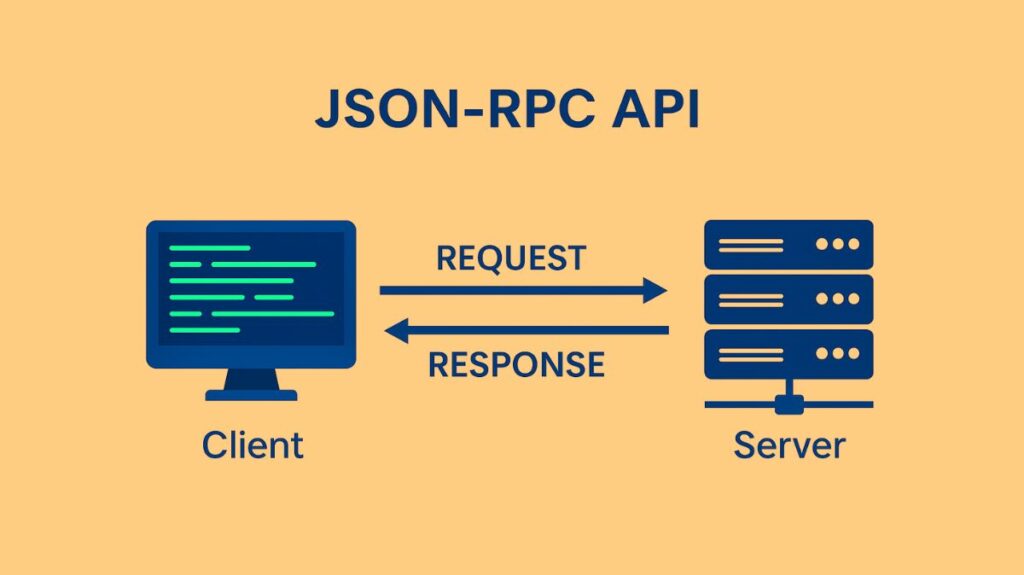What Is JSON RPC

JavaScript Object Notation-Remote Procedure Call, or JSON-RPC API, is a stateless, lightweight RPC protocol that employs JSON as its data format. For apps to engage and communicate with an Ethereum node, it serves as an essential interface.
Here’s a thorough breakdown:
Core Purpose and Structure
JSON-RPC’s major goal is client-server remote procedure call execution. This allows web programmes (DApps) to interface with Ethereum nodes.
Four primary characteristics make up a typical JSON-RPC request:
- jsonrpc: JSON-RPC protocol version string (“2.0”).
- method: A string specifies the server method to call.
- params: The values of the parameters that will be utilized when the method is invoked are contained in this.
- id: A special request identification that is given back in the answer to match requests with the appropriate responses.
Get the Coinbase address via a JSON-RPC call:
{“jsonrpc”:”2.0″,”method”:”eth_coinbase”,”params”:[],”id”:67}.
Advantages of JSON-RPC
- Understated yet sophisticated: For encapsulating remote procedure calls, JSON-RPC offers a straightforward and sophisticated protocol. It is commonly used for client-server interactions, online services, and browser-based application exchange. It was originally built for Netscape/Mozilla.
- Compared to HTTP POST and HTTP GET, JSON-RPC offers a few advantages. JSON has a smaller codebase that works well across a range of systems and has less verbosity than XML. The entire protocol was made to be expandable by adding additional operations and data kinds.
Ethereum JSON-RPC
In contrast to raw Weka, RPC, and Web3 connections, Ethereum JSON-RPC offers a consistent interface for Ethereum’s universal command line interface.
- This JSON-based HTTP web service is compatible with all programming environments. Interaction with Ethereum nodes is made possible both inside and outside of the browser environment.
- JSON-RPC is a simple HTTP 1.1 remote procedure call protocol encoded in JSON. Web3 object methods are used to build the Ethereum JSON-RPC API, which enables clients to communicate with the Ethereum blockchain.
- Mist, a well-known Ethereum wallet, Ethereum Wallet, and a number of other well-known wallets and apps also use the JSON RPC API.
- The pattern for the Ethereum JSON-RPC API requests is as follows: TransactionHash (string, optional): The hash to which the contract code is attached. The presently chosen account will be used to try to create a contract if no transaction hash is supplied.
Interaction with Ethereum Nodes
The JSON-RPC interface, which is exposed by Ethereum nodes, is a collection of widely used techniques that let client software send transactions and view blockchain data. Although Web3.js is a low-level interface, it frequently generates these calls for you, offering a higher-level abstraction.
Connection Protocols
Several protocols are available for transporting JSON-RPC messages:
- HTTP Protocol: This conveyance is the most basic. HTTPS, which may require minimal authentication, allows POSTing JSON messages. For its HTTP-RPC server, Geth listens on TCP port 8545 by default.
- WebSocket Protocol: A client and server have a constant two-way connection. It lets clients subscribe to node updates in addition to JSON-RPC requests.
- Inter-Process Communication (IPC) Protocol: This protocol runs locally on a PC and communicates with a Geth console using a pipe (like geth.ipc).
Role in Web3.js and DApp Development
Web3.js supports RPC, including JSON-RPC, for Ethereum nodes. Abstracting RPC calls simplifies web app account administration, transaction logging, blockchain connectivity, and smart contract execution. Many DApps use Web3.js, which uses JSON-RPC to connect to the blockchain. Web3 providers like MetaMask inject web3 objects into RPC-connected blockchain browsers.
Examples of JSON-RPC Usage with Geth
JSON-RPC instructions are exposed by the Geth client and can be used directly to build raw transactions or query the blockchain. The Geth RPC interface can be accessed by sending POST requests over HTTP using the curl command-line tool.
Using curl and the Geth JSON-RPC API, some examples of what you can query include:
- Listing accounts: The personal_listAccounts method shows all of the client’s Ethereum accounts.
- Checking network status: Checking if the network is operational.
- Getting client version: The version of the Geth client is displayed.
- Synchronization information: Provide information about the state of synchronization at the moment (e.g., current block, highest block).
- Finding the Coinbase address: Coinbase client address.
Geth must be started with –rpc and –rpcapi to activate the HTTP-RPC server and choose which APIs are accessible over that protocol, such as eth, nett, web3, personal, and debug.
Security Considerations
The –rpccorsdomain flag must be properly configured, particularly on public networks. If private keys or Ethereum are kept locally on the node, setting it to * (wildcard) leaves the exposed RPC endpoint open for all remote connections to your Ethereum node.
Interaction with Smart Contracts
The Application Binary Interface (ABI), which functions similarly to an API for smart contracts, must be referenced in order to do any read/write operations with them. JSON-RPC calls are sent to the address of the smart contract in order to transmit transactions (which alter state and incur gas costs) or query information (for view or pure Solidity functions, which do not incur gas costs).
Integration with Development Tools
Several frameworks and development tools within the Ethereum ecosystem make use of the JSON-RPC API:
- Remix IDE: Can communicate with Web3.js in a variety of settings, such as “Web3 Provider” for local Geth nodes, and can produce the bytecode and ABI required for deployment scripts that communicate via JSON-RPC.
- Ganache: Through its RPC interface (e.g., on port 7545), Ganache serves as a Web3 provider for local testing and functions as a simulated blockchain.
- MetaMask: allows web clients to manage user accounts and sign transactions by connecting to the blockchain provider over the RPC port.
- Truffle: Web3.js is used internally by this development framework to test and deploy smart contracts, which use JSON-RPC calls.
- Etherscan: A web-based blockchain explorer and a simple HTTP API that provides numerous JSON-RPC interface methods for blockchain data querying are provided by this centralized service.
